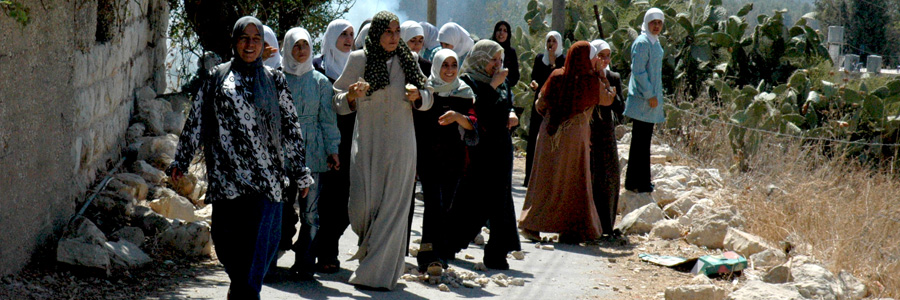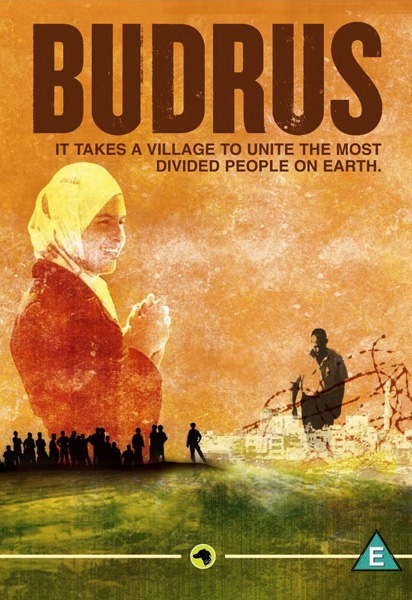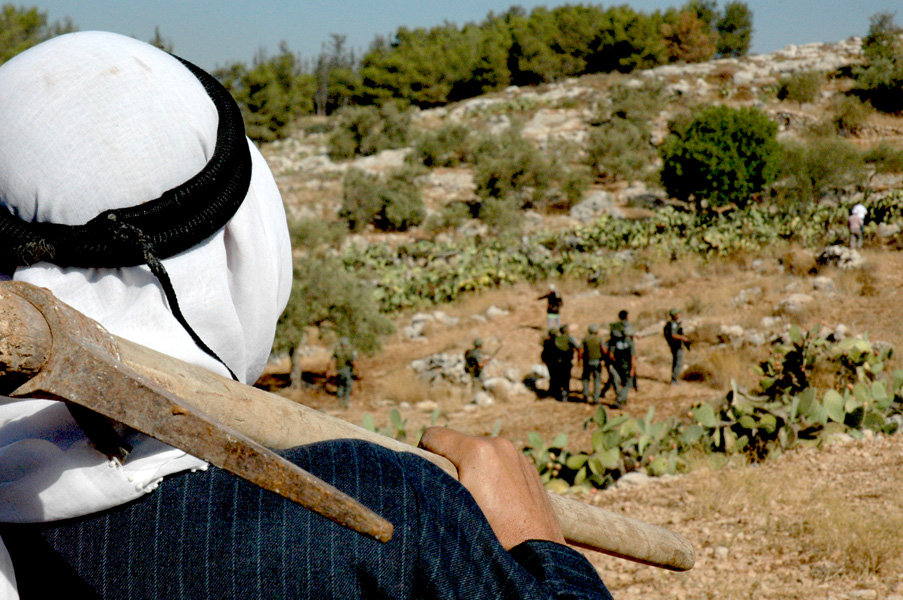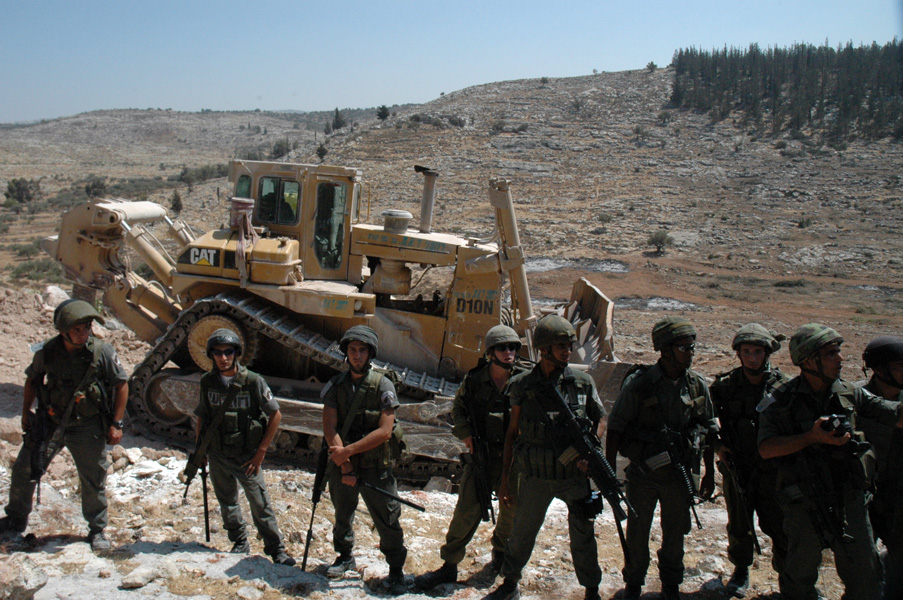
Budrus

BUDRUS (DVD)
Dogwoof
Release date: May 16th 2011
Running time: 82 minutes
Original language: Arabic, Hebrew, English
Country of origin: Israel, Occupied Palestinian Territory, USA
Director/Writer: Julia Bacha
Producer: Ronit Avni
Cast: Ayed Morrar, Iltezam Morrar, Kobi Snitz

When the events documented by Budrus took place in 2004, Arab democrats and liberal activists could not have foreseen a popular movement on the scale of that which spread across the Middle-East and North Africa this year.
One such beleaguered campaigner was Palestinian Ayed Morrar, whose monologue introduces the film. He wears the long-suffering expression of a man who has endured imprisonment, aggressive interrogation and a lifetime of- as he regards it- occupation of his homeland. Yet somehow peering through the melancholy there is a hope as unshakeable as it will need to be.
Budrus is a small olive farming village of 1500 on the fringe of the border between Israel and the West Bank. When following an intensification of violence in 2002 Israel announced its intention to construct a “security fence” along the 1949 Armistice line, Budrus was among six communities which would in effect be ox-bowed by the circuitous new perimeter, cutting it off from Palestinian territory.
The “apartheid” or “racial segregation” wall, as some have dubbed it, would also run 40m from a school and divide the cemetery. Furthermore the villagers traditional livelihood could be all but destroyed under the plans, as 300 acres of land will be seized and 3000 olive trees uprooted in order to make way for construction and a 60m “exclusion zone”.
One wonders why these poor and otherwise tractable folk are being subjected to an incursion which the end of the film proves to be totally gratuitous. Does Israel want to weaken a town which has nurtured activists such as Ayed Morrar? Or is this perhaps a more arbitrary exercise of power?

The village resolves after some debate- indeed it is particularly striking the humility and democracy with which every decision is made by this community- to peacefully resist the construction on their land.
And it is the gentle Morrar who leads the people of Budrus in a total of 55 heroically non-violent protests against the bulldozers and the army as Israeli measures to quell the opposition escalate in violence.
Brazillian born director Julia Bachas is a graduate in Middle-Eastern History and Politics who went into filmmaking when she joined Just Vision, a non-religious non-partisan media organisation whose objective is to assist the peaceful resolution of the Israeli-Palestinian conflict.
Her film is as you therefore might expect a well-informed and delicately polemical documentary about the possibilities of non-violent activism. While focussing on the resistance movement the film also gives a military spokesman several opportunities to justify the Israeli methods and objectives, and follows the compelling side-story of a border patrol officer who unexpectedly finds herself in an ambivalent relationship  (now antagonism, now sisterly admiration) with the female protestors. Indeed the role of women in this conflict is an insistent subplot of the film- and no doubt of the Arab Spring in general.
(now antagonism, now sisterly admiration) with the female protestors. Indeed the role of women in this conflict is an insistent subplot of the film- and no doubt of the Arab Spring in general.
Neither panegyric nor invective, Budrus declares its hand subtly whilst allowing the facts to speak for themselves. It is horrifying to see women struck with military batons, and I wouldn’t choose to witness live ammunition used against unarmed civilians; but there it is, and to politically naïve eyes it looks extremely wrong.
Of course we don’t see the opposing violence that Israel maintains necessitates this response. But if either side is allowed to act with impunity- as it appears Israel almost was here- then there is very little hope of peace at all.
This is why media exposure- the work of Just Vision- is so important to conflict resolution. The presence of their cameras will have affected the course of events. To  paraphrase Herr Marx: documentaries have hitherto only observed the world; the point is to change it.
paraphrase Herr Marx: documentaries have hitherto only observed the world; the point is to change it.
But even more than that, Budrus provides a positive image of possible cooperation and harmony. It is tremendously moving to see Ayed’s faith rewarded when not only different Palestinian factions (e.g. Hamas, who are known for their advocacy of violence) join the peaceful movement, but many dozens of Israeli citizens risk arrest to defend their neighbours.
In the week that Hamas and Fatah have signed a deal to resolve their differences and “turn the black page of division forever”, let us hope that this confident and sensitive documentary heralds a change in the mood of diplomatic relations between divided groups in the Middle-East.

Dominic Walker
Dominic is an English graduate, promiscuous dilettante and epistemological liability. He likes the sentimentalisation of loathsomeness, fetishized Teutonic Romanticism, the labour theory of value and Manchester United’s transcendent Bulgarian striker, Dimitar Berbatov. He abominates Certainty, curses The Wealth of Nations, and detests only mayonnaise more than asinine bathetic turns.
His favourite kinds of film are laborious, unyielding, laboriously unyielding, anything you’ve never heard of, and pornographic. At twenty-three, his achievements include A Spectroscopic Study of the Notion of Perineum in Jane Austen’s Later-Early Period, for which he won a MOBO award, and this sentence.
© 2022 STATIC MASS EMPORIUM . All Rights Reserved. Powered by METATEMPUS | creative.timeless.personal. | DISCLAIMER, TERMS & CONDITIONS
HOME | ABOUT | CONTACT | TWITTER | GOOGLE+ | FACEBOOK | TUMBLR | YOUTUBE | RSS FEED
CINEMA REVIEWS | BLU-RAY & DVD | THE EMPORIUM | DOCUMENTARIES | WORLD CINEMA | CULT MOVIES | INDIAN CINEMA | EARLY CINEMA
MOVIE CLASSICS | DECONSTRUCTING CINEMA | SOUNDTRACKS | INTERVIEWS | THE DIRECTOR’S CHAIR | JAPANESE CINEMA





